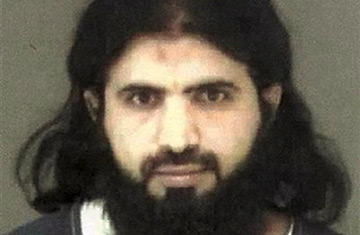
Ali Saleh Kahlah al-Marri, the Qatari national and suspected al Qaeda operative, and the only person being held in the United States as an 'enemy combatant.'
How many times does the Bush Administration have to bungle a legal challenge to its detention of suspected terrorists — and, thanks to its own deception, leave yet another shady suspect looking sympathetic — before it gets its act in order?
A week after two judges halted detainee hearings at Guantanamo Bay, Cuba, over a statutory glitch, a federal appeals court in Richmond, Va., ordered Al Saleh Kahlah al-Marri released from military detention. As a civilian in the United States on a student visa, al-Marri has the right to a full and fair hearing in court and cannot be held indefinitely as an enemy combatant in the war on terror, the court ruled Monday. Al-Marri won't get out of the military brig in South Carolina immediately, but the Administration has to decide soon whether to try him in criminal court, hold him temporarily as a grand jury witness against other suspected terrorists, deport him — or let him go.
Probably no one outside of al-Marri's wife and kids in Peoria, Illinois, prefers the last option. A citizen of Qatar, al-Marri allegedly trained at an al-Qaeda camp in Afghanistan, palled around with Osama bin Laden and came to the U.S. on Sept. 10, 2001 as a "sleeper agent," a computer hacker bent on disrupting the American financial system. He was arrested at home three months later as a material witness in the investigation of the Sept. 11 attacks. Al-Marri denies any connection with al-Qaeda or terrorism, but constitutional issues aside, we might all rest easier if the military could just keep him out of circulation for awhile.
After all, that's what it has been allowed to do with people like Yaser Esam Hamdi, an American citizen captured while fighting for the Taliban in Afghanistan (he was eventually deported to Saudi Arabia in exchange for renouncing his citizenship). Al-Marri isn't even a citizen, and he was caught allegedly pursuing terrorism within the U.S. Isn't he exactly the kind of guy that the Administration should be allowed to declare an enemy combatant and hold in a military brig?
This is not an easy question. Fortunately, two of the three appeals-court judges were clear-headed enough to see a distinction. Hamdi and others captured while actively fighting the U.S. on a foreign battlefield, or shortly after leaving the battlefield, naturally fit under the laws of war and can be held, with minimal rights, by the military so that they do not return to the enemy to fight again. The Bush Administration argued that al-Marri was also an enemy combatant, committed to fighting on behalf of al-Qaeda, but the court didn't see it that way. It ruled that al-Marri, no matter how dangerous, is just a civilian. And any civilian in the U.S. legally has the right when arrested to hear the charges against him, to be tried by a jury and to receive all the other benefits of due process under the Constitution. As the three-judge panel said in its majority opinion, to allow the President "to order the military to seize and indefinitely detain civilians, even if the President calls them 'enemy combatants,' would have disastrous consequences for the Constitution — and the country."
